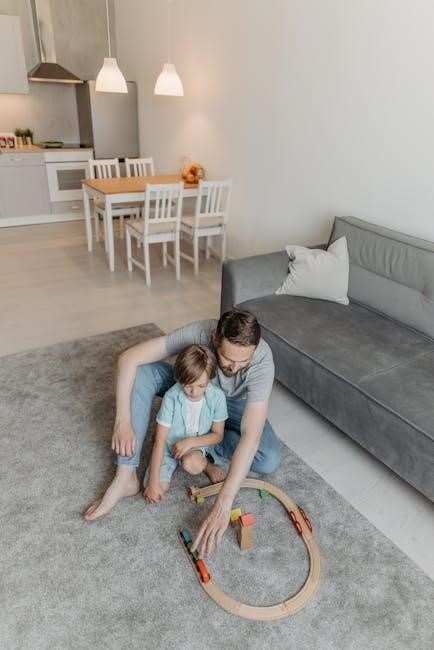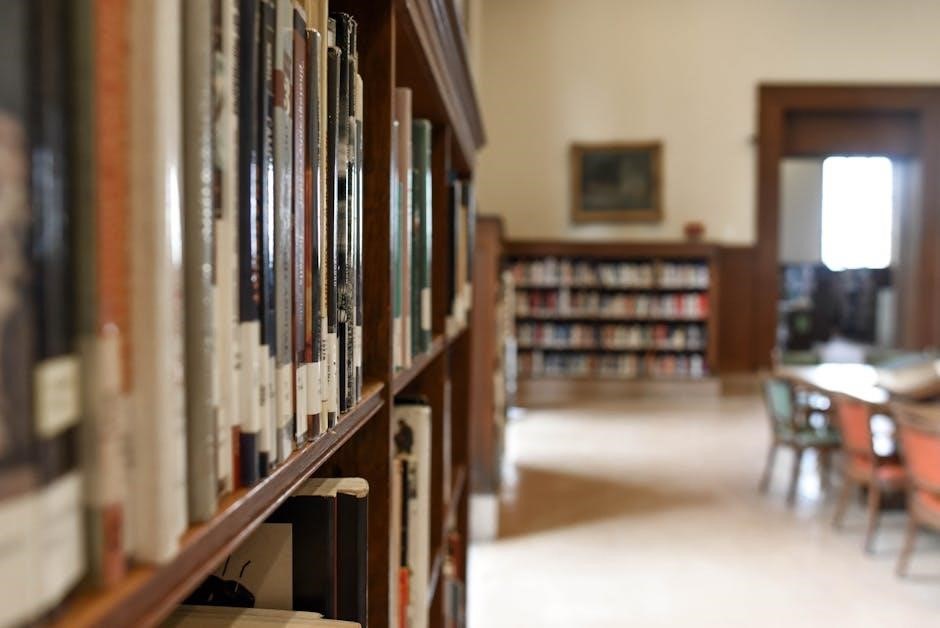The Early Years Foundation Stage (EYFS) is England’s framework for enhancing learning and development in children from birth to five. It focuses on play-based education‚ fostering holistic development and preparing children for school and life through structured‚ engaging activities.

Overview of the EYFS Framework
The Early Years Foundation Stage (EYFS) is a statutory framework in England for children from birth to five years old. It outlines the standards for learning‚ development‚ and welfare in early years settings‚ ensuring a smooth transition from home to school. The framework emphasizes play-based learning‚ allowing children to explore‚ experiment‚ and develop skills naturally. It is divided into two main categories: the Prime Areas (Personal‚ Social and Emotional Development‚ Physical Development‚ and Communication and Language) and the Specific Areas (Literacy‚ Mathematics‚ Understanding the World‚ and Expressive Arts and Design). The EYFS also includes the Characteristics of Effective Learning‚ which highlight how children learn best—through playing and exploring‚ active learning‚ and creating and thinking critically. Practitioners use these areas to observe‚ assess‚ and plan activities tailored to each child’s needs‚ fostering a holistic approach to early childhood education.

The 7 Areas of Learning and Development in EYFS
The EYFS framework is structured around 7 interconnected areas of learning‚ divided into Prime and Specific Areas. These areas ensure a balanced approach to early childhood education‚ fostering holistic development and preparing children for future success.
Prime Areas of Learning

The Prime Areas of Learning in the EYFS framework are essential for building strong foundations in early childhood development. They consist of three key areas: Personal‚ Social and Emotional Development‚ Physical Development‚ and Communication and Language. These areas are particularly important during the first three years of life‚ as they lay the groundwork for future learning and social interactions. Personal‚ Social and Emotional Development focuses on helping children develop self-awareness‚ form positive relationships‚ and manage their emotions effectively. Physical Development encourages children to gain control over their bodies through movement‚ coordination‚ and healthy lifestyles. Finally‚ Communication and Language nurtures listening‚ speaking‚ and understanding skills‚ which are vital for effective interaction with others. Together‚ these areas create a holistic approach to early education‚ ensuring children are well-prepared for their educational journey ahead.

Personal‚ Social and Emotional Development
Personal‚ Social and Emotional Development is a cornerstone of the EYFS‚ focusing on helping children develop a positive sense of themselves and others. This area emphasizes building self-awareness‚ self-confidence‚ and social skills‚ enabling children to form meaningful relationships and respect others. It also encourages emotional intelligence‚ teaching children to understand‚ express‚ and manage their feelings effectively. Key aspects include developing empathy‚ learning to share‚ and understanding boundaries. This area also fosters a sense of responsibility and independence‚ preparing children to navigate social situations and collaborate with peers. By fostering resilience and self-regulation‚ it equips children with essential life skills that underpin all other areas of learning and development. This foundational area is particularly critical during the early years‚ as it shapes children’s ability to interact positively with the world around them and builds a strong base for future academic and personal success.

Physical Development
Physical Development in the EYFS focuses on children’s growing ability to control their bodies and coordinate movements. This area is divided into gross motor skills (e.g.‚ running‚ jumping‚ climbing) and fine motor skills (e.g.‚ using utensils‚ drawing‚ and writing). It also includes understanding the importance of physical activity for health and well-being. Practitioners encourage children to explore their physical capabilities through play‚ helping them develop strength‚ balance‚ and coordination. Additionally‚ this area supports children in learning to care for themselves‚ such as dressing‚ using the toilet‚ and handling tools confidently. By fostering a love for physical activity‚ the EYFS helps children build the foundation for a healthy‚ active lifestyle. This area is closely linked to other aspects of development‚ as physical confidence often enhances social and emotional growth‚ allowing children to engage more fully in all learning opportunities.
Communication and Language

Communication and Language is a prime area of learning in the EYFS‚ focusing on children’s ability to listen‚ speak‚ and understand others. This area is crucial for building strong relationships and accessing all other areas of learning. It involves developing vocabulary‚ sentence structure‚ and storytelling skills‚ as well as understanding and responding to instructions. Practitioners encourage children to engage in conversations‚ listen attentively‚ and express their thoughts clearly. Activities such as reading books‚ singing songs‚ and role-playing help foster these skills. The development of communication and language skills is supported through play‚ providing opportunities for children to practice speaking and listening in meaningful contexts. This area also lays the foundation for literacy skills‚ enabling children to explore the world of words and stories. By nurturing these abilities‚ the EYFS helps children become confident communicators‚ ready to succeed in school and beyond. Effective communication is a cornerstone of social interaction and lifelong learning.

Specific Areas of Learning
The Specific Areas of Learning in the EYFS include Literacy‚ Mathematics‚ Understanding the World‚ and Expressive Arts and Design. These areas build on the Prime Areas‚ focusing on essential skills and knowledge for future education and life. They encourage children to explore‚ create‚ and understand the world around them‚ fostering curiosity and critical thinking. These areas are particularly emphasized as children grow older‚ preparing them for more structured learning in school. Each area is interconnected‚ ensuring a balanced and holistic approach to early childhood education. The Specific Areas help children develop foundational skills in reading‚ writing‚ numeracy‚ and creative expression‚ laying the groundwork for lifelong learning and personal growth.
Literacy
Literacy in the EYFS focuses on developing children’s skills in reading and writing. It encourages a love for books‚ exploration of sounds‚ and understanding of letters and words. Activities include sharing stories‚ making marks‚ and learning phonics to decode words. Literacy helps children express thoughts‚ communicate ideas‚ and build confidence in their abilities. It supports early writing skills‚ such as forming letters and sentences‚ while fostering a connection between reading and writing. This area helps children understand the purpose of print and develop a foundation for lifelong learning and communication. Literacy is essential for future academic success and is integrated into play and daily routines to make learning engaging and meaningful. By nurturing these skills‚ children gain the tools to express themselves effectively and explore the world of words and stories. Literacy is a cornerstone of the EYFS‚ preparing children for more formal education and fostering a lifelong love for reading and writing.
Mathematics
Understanding the World
Understanding the World is a vital area of learning in the EYFS‚ designed to help children explore and make sense of their surroundings. This area focuses on developing curiosity and a sense of wonder‚ encouraging children to ask questions and seek answers. It includes opportunities for children to learn about people‚ places‚ and environments‚ fostering an understanding of different cultures and communities. Technology is also a key component‚ with children introduced to simple tools and digital devices to enhance their learning. Activities such as observing nature‚ using maps‚ and engaging with stories from various cultures are common. This area also promotes an awareness of the past and present‚ helping children understand the concept of time and how things have changed over time. By exploring these themes‚ children develop critical thinking skills‚ a broader perspective on the world‚ and a foundation for future subjects like history‚ geography‚ and science. This area is essential for nurturing open-mindedness and a lifelong love of learning.

Expressive Arts and Design

Expressive Arts and Design is a vibrant area of learning in the EYFS‚ fostering creativity and self-expression in children. This area encourages children to explore and communicate their ideas through various art forms‚ including painting‚ drawing‚ sculpting‚ and role-playing. It also introduces children to design technology‚ where they can create and build models‚ developing their problem-solving skills. Music‚ dance‚ and drama are integral parts of this area‚ allowing children to express emotions and stories in unique ways. By engaging in imaginative play‚ children develop their critical thinking and collaboration skills. This area helps children gain confidence in their abilities and fosters an appreciation for different forms of artistic expression. Through hands-on activities‚ children learn to experiment‚ take risks‚ and refine their creations‚ laying the foundation for future creative endeavors and a lifelong enjoyment of the arts. Expressive Arts and Design is essential for nurturing innovation and individuality in young learners;

